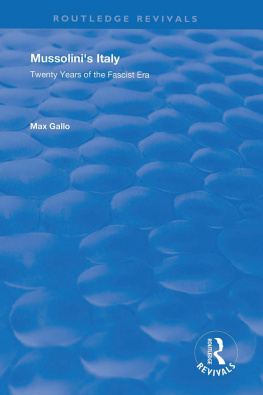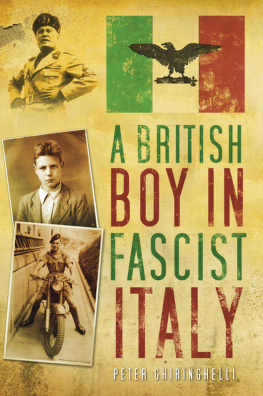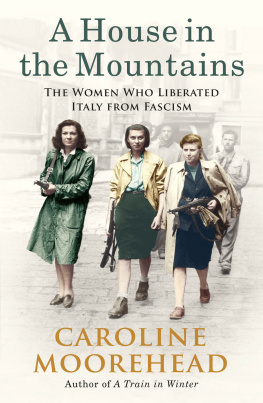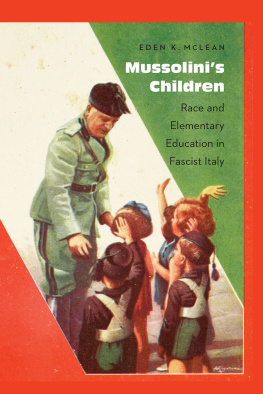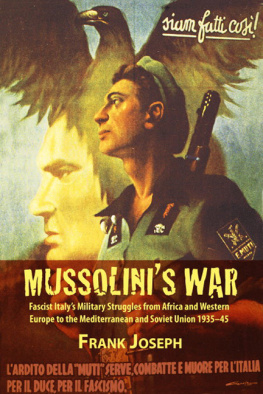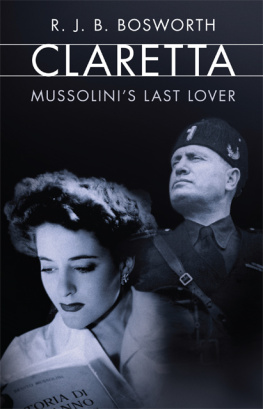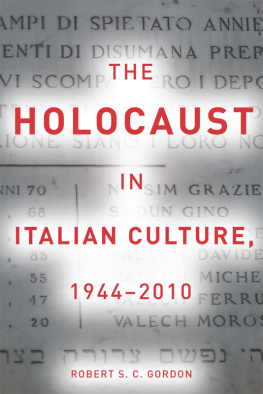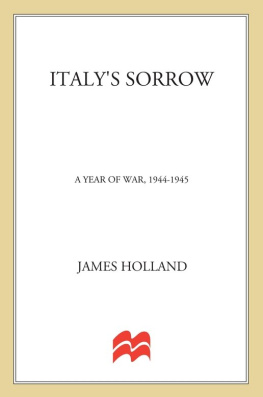200,000 HEROES
Italian Partisans and the American O.S.S. in WW II
Leon Weckstein

200,000 HEROES
2011 Leon Weckstein
Published by Hellgate Press
(An imprint of L&R Publishing, LLC)
All rights reserved. No part of this publication may be reproduced
or used in any form or by any means, graphic, electronic or mechanical,
including photocopying, recording, taping, or information and retrieval
systems without written permission of the publisher.
Hellgate Press
PO Box 3531
Ashland, OR 97520
www.hellgatepress.com
Editing: Harley B. Patrick
Cover design: L. Redding
Library of Congress Cataloging-in-Publication Data available upon request.
Printed and bound in the United States of America
First edition 10 9 8 7 6 5 4 3 2
Italian partisans worked with increasing boldness behind German lines. Armed with weapons captured from Germans or dropped by Allied aircraft, they were often trained and organized by Allied officers who penetrated enemy lines or parachuted behind them. Sensing that the time was ripe for action, partisan bands stepped up their activity, cutting telephone wires, ambushing troops and dynamiting culverts, bridges, roads and railroad tracks.
And all across northern Italy the partisans rose up. On a signal, railway workers sabotaged track in a number of provinces to prevent the movement of German troops and supplies. In Genoa partisan groups cut off water and electricity service to German barracks and established roadblocks to prevent enemy troops from escaping, or being reinforced. In a pitched battle they thwarted German demolition squads bent on destroying the citys port installations. Their ranks swelled with overnight volunteersguerilla brigades in dozens of other Italian cities, including Milan and Turinforced the surrender of German garrisons and were firmly in control by the time the Allied troops arrived.
(Excerpted from the renowned Time-Life World War II book titled, The Italian Campaign, written by Robert Wallace and editors of that series.)

A Bill Mauldin cartoon from 1944 depicting three German soldiers desperately trying to evade any Partisans that might be near. Though in France at the time, Mauldin humorously illustrates the fear the enemy had developed regarding the Italian Partisans. Leon Weckstein visited the two-time Pulitzer Prize-winning cartoonist two weeks before he passed away in 2003 to present him with a Medallion for Excellence from the 91st Infantrys leader, General Rodney Kobayashi.
CONTENTS
CHAPTER ONE
In the Beginning
CHAPTER TWO
Creation of a Hero
CHAPTER THREE
Life and Death in Rome
CHAPTER FOUR
Partisan Women
CHAPTER FIVE
Angelina
CHAPTER SIX
The Tuscan Riviera and the Mountains to the North
CHAPTER SEVEN
Incident in Milan
CHAPTER EIGHT
American OSS and the Partisans
CHAPTER NINE
Living with the Partisans: The Story of James Wilde
CHAPTER TEN
Partisans and Prisoners
CHAPTER ELEVEN
Of Men and Madness

The author (center) with Partisans Emmio Sardelli (left) and Riccardo Barchielli (right). Florence, Italy, 2000.
AUTHORS NOTE
Epic actions of the Italian and American heroes that follow are not fiction. Their truth resides in historic files, biographical field reports and Partisan recollections that remain vividly galvanized within their aging, yet canny minds.
With such helpful details and with Partisan urging, their soul-stirring stories ached to be revived into a compact chronology for all to see and commemorate.
The need to share my own excitement with an appreciative audience came to fruition after a visit to Partisan headquarters at their Tuscany headquarters in Florence, twelve years ago. We had been loading up on Chianti and schmoozing about the old days when Partisan Ennio Sardelli pressed me to write about his brigades stormy past. Somewhat blotto from the heady Italian vino and feeling no pain, I hadnt comprehended that our convivial get-together would soon lead to a bonanza of reading material that ultimately overwhelmed my mailbox in California; yellowing records and journals that had hibernated in their dusty Partisan files for half a century.
Intermixing those historic documents with sparkling anecdotes I had gleaned from my unforgettable crony, Partisan Alberto Secchi, during the rich hours we shared off the line, it seemed that not proceeding would have been sinful.
More of their glorious history evolved as I began to write, aided with generous historic contributions donated by Italian war historian Claudio Biscarini and others who were insufficiently extolled in the acknowledgements that follow.
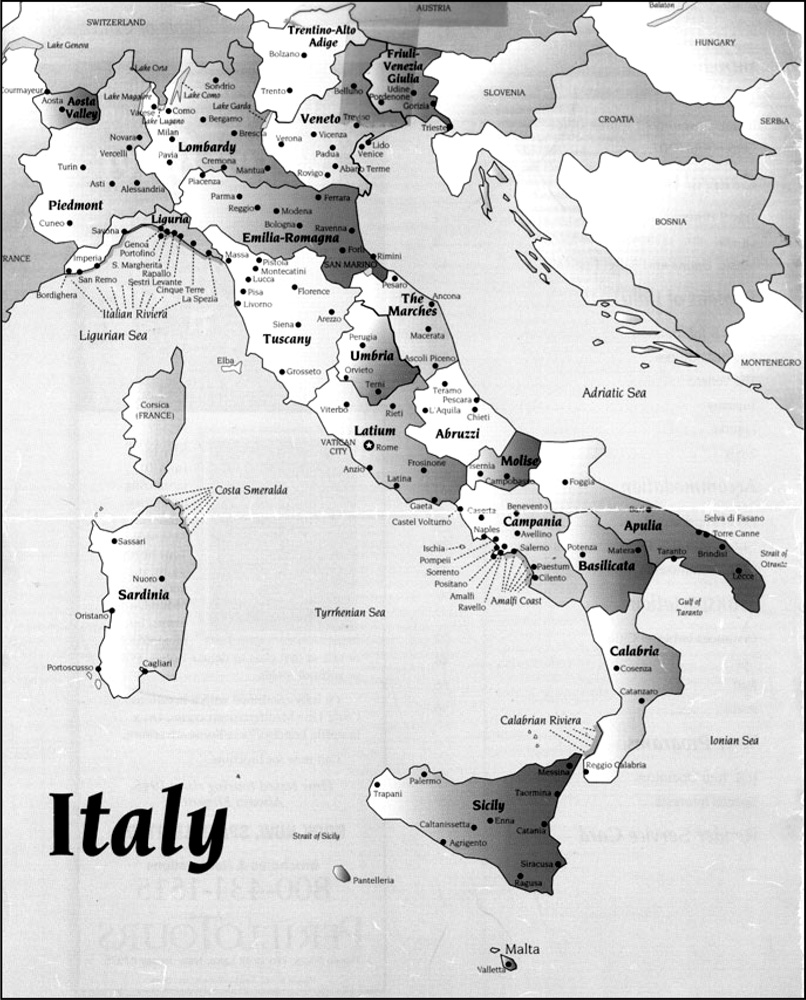
Map of Italy outlining its major provinces.
ACKNOWLEDGMENTS
This book would never have been realized without the assistance of American/Italian tutor Frank Fedeli, who assisted me by interpreting the many noteworthy documents received from Italian Partisan sources. He, along with World War II historian Claudio Biscarini, were my saviors when I needed to provide the reader with authoritatively correct information. Claudio is a collector and author of Italys military history at the prestigious Cento Di Documentazione Internazionale Storia Militare in Tuscany. His informative tracts and photos kept arriving to complete the details needed to shed factual light on much of the data within these pages. They, along with the magnificent Partisan heroes who fought so gallantly in Italy, France and Yugoslavia, provided their gracious knowledge without expectation.
I will never forget Partisans Ennio Sardelli and Riccardo Barchielli, heroes who I had the pleasure of visiting at their headquarters in Florence. Their important contribution of archives were more than generous, and their encouragement led to the first of the promises I made to help in reactivating the waning image of their former glory days.
The warm friendship I shared with my Partisan buddy, Alberto Secchi, continues to flourish in my consciousness and haunts every page Ive written.
Im enormously indebted to David Honeck, a dear friend and retired English professor who mentored at Bentley College in Waltham, Massachusetts. He enjoyed reconstructing and correcting my crude phrasings, misplaced commas and other slips of the pen.
Famed author and screenwriter Harold Livingston enlightened me where to drop the adjectives and pal Jerry Epstein hovered apprehensively over my shoulder as I worked, offering inspirational nudges whenever I needed support.
Former comrade-in-arms and 91st Infantry Division historian Roy Livengood was most gracious with his exceptional memory and offered long-forgotten details of the grim war we shared.



